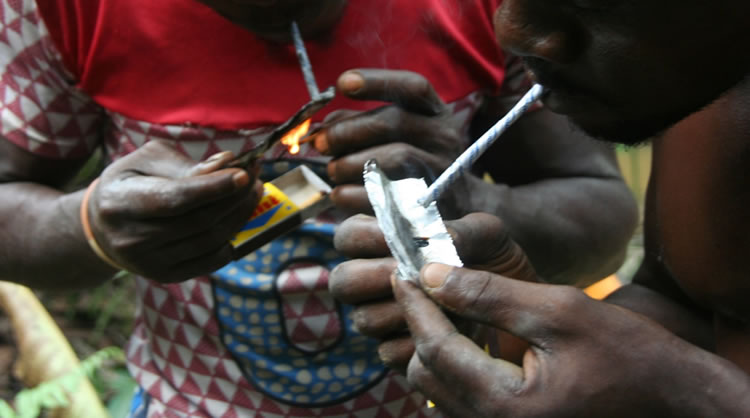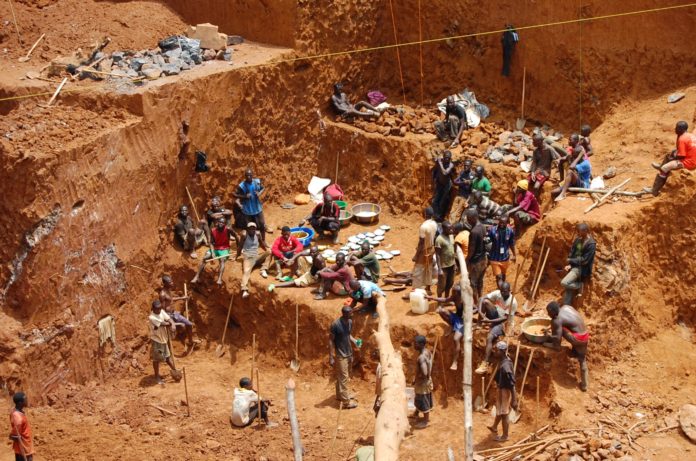Top: Miners at a goldmine in Vambo, Grand Bassa County. The DayLight/ K.K.
By Emmanuel Sherman
MONROVIA – Johnny John’s (not his real name for security reasons) pregnant girlfriend was close to labor, so he had to intensify his daily hustle. Unemployed and the sole breadwinner for his two-person family at the time, life was an uphill climb for the 25-year-old. But all of that changed when he met this Nigerian drug smuggler.
“He called me and said, ‘My man I sell drugs. We can operate and you can get something for yourself so when your girl gives birth you get some money,’” John tells The DayLight on a car bound for Compound Number One, Grand Bassa County.
“So, myself, I started it.”
Nigerians are infamous for drug smuggling in Liberia. In 2018, for instance, 10 out of 13 drug trafficking cases involved a Nigerian, according to the Liberia Drug Enforcement Agency (DEA). Nearly a dozen Nigerians have been arrested or prosecuted between 2009 and this year, according to our analysis of several news stories and reports within that period.
John was a little bit nervous on his first mission. He knew the risk involved in this illegal transaction. The police would arrest him if he was caught and he could spend some time in jail.
“I was scared. I started it in Duport road, down Duport road…there is a ghetto there,” John says.
But his fears soon vanished. All of his drugs or “parcels,” as he calls them, were sold. Duport Road was the best place for a starter. The infamous slum is a hub for illicit drugs and criminal activities.
John’s debut was amazing as he pushed L$20,000 worth of heroin and received a L$4,000 commission from his Nigerian boss. His boss knew that he had become fearless in the operation and was excited about it.
That night his girlfriend was happy about the money he took home but she did not know how he got it. He kept it a secret.
John would go on to have several other successful missions after his inaugural operation on Duport Road. There were three on the Old Road, five in the Gobachop market, and countless times in the Red-Light area. Now it was time to venture outside of Monrovia, into the goldfields, the main market of his Nigerian boss.
John started with a goldmine called “Philadelphia” in Grand Gedeh County. It would lead him to other mines across the country such as at Sand Beach in River Cess, “New York” in River Gee, and Kinjor in Grand Cape Mount. If the open ghettoes in Paynesville offered him an opportunity, the canopy of the forest presented a perfect hideout.
Crossing checkpoints were John’s new worry. In the Paynesville area, he did not have to cross them. However, he was prepared for it. His boss had connections that proved useful in a number of instances.
The checkpoint between Nimba and Grand Gedeh was always a tough nut to crack. The officer often asked the passengers to disembark the vehicle and checked their loads. One time, he nearly got caught. An Officer of the Liberia Drug Enforcement Agency (LDEA) asked for the owner of the bag of rice he was carrying. John thought that was the end, but he managed to compose himself.
“I told him I was carrying it up the mine for my people,” he told The DayLight, revealing he often camouflaged the banned substance in legitimate goods.
“We stuffed them in bags of rice, fufu. The rice is something to eat, but sometimes I gave it out. I just want my market to land in the place. I only care for the market.”
Once he crossed all the checkpoints on the route to a particular destination took a motorcycle taxi, something that is predominantly used for transport in the rural parts of the country. The drivers are famed for riding in rough terrains. That profile makes it gel well with the bush routes leading to goldfield and diamond creeks across the country.
John’s sales justified his risk, fetching him between LD$200,000 or LD$300,000 worth of drugs.
“Drug is not something for credit. As soon as you give it to a person; the person gives you your money,” he tells me.

Individual miners made John’s clients list but mine owners were his biggest business partners. Artisanal mineworkers say heroin stimulates them. Known among drug pushers and users as “tar,” heroine is a very addictive drug, responsible for the huge number of disadvantaged youths or “zogos.”
“If I don’t take it, I can’t work,” said one drug user at a goldmine in Kaquekpo, Sinoe County in 2017. It can make me do the gold work perfectly, 24 hours, day and night, no resting.”
Mine owners encourage drug dealers on their claims in a bid to enhance productivity. A 2016 USAID-funded report by the Foundation Against Illicit Drugs and Child Abuse found that mine owners and mine workers even exchange gold for illicit drugs.
John’s favorite goldmine was kinjor in Grand Cape Mount, a region that has a huge potential for gold, and is home to many artisanal goldfields. It is renowned for hosting the New Liberty Goldmines, Liberia’s first industrial gold project. On one operation, he sold half of a million Liberian dollars.
“My phone used to ring like [Minister of Finance and Development Planning] Samuel Tweah,” John says, bursting into a huge laughter.
At that point, Johns’s family status had well improved. He was no longer worried about “how to start his day.” His newborn daughter was now three years old and was now at one the best schools in Congo Town. Her mother, his girlfriend was doing a lucrative business. He gave out money easily and threw parties almost regularly.
John’s lavish lifestyle did not go unnoticed. His relatives and friends became concerned. The news finally hit them that he was one of the most prolific drug pushers. Occasional visits to his house by notorious drug users made things even worse for him and open recognition by zogos was too much of a coincidence. His relatives advised him and he heeded.
“I get my children. I don’t want them to hold me accountable” [for destroying other people’s children’s future],” Johns says. “I feel guilty, but I don’t have the financial support to assist the people whose lives I helped destroy.”

